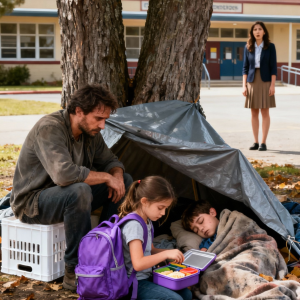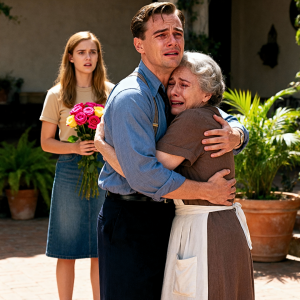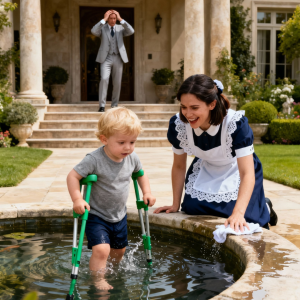
The first thing I remember that morning was the sunlight pressing insistently through the curtains. I rolled over, expecting to find my husband already beside me, but Harold was sitting at the edge of the bed, his shoulders tense and unmoving, his gaze fixed on nothing. Fifteen years of marriage had taught me his silences were not empty. They were storms held in check.
I padded into the kitchen and set water to boil, clinging to the comfort of ritual. The room, with its floral curtains and rows of mismatched mugs, had always been my refuge. Harold joined me a moment later, his face pale, his eyes dulled of warmth. I offered him a steaming cup.
“Rough day at the office ahead?” I asked softly.
His answer came flat, almost mechanical. “Everything is fine.”
The doorbell rang with a sharp insistence, and I already knew who stood outside. When I opened the door, my mother-in-law swept past me, carrying a box of pastries and her usual cloud of disdain. Agnes never needed words to belittle me; her arched brow and tight smile were enough.
She turned tender when addressing her son. “My poor boy, you look unwell. Has she been neglecting you again?”
The question landed like a slap. Harold said nothing, only pressed his lips together as if he were swallowing something bitter. The air in the kitchen thickened until I could hardly breathe. I excused myself, claiming I needed a shower, desperate to escape that oppressive atmosphere.
The hot spray should have calmed me, but unease clung stubbornly to my skin. When I stepped out, towel clutched tight, Agnes was waiting in the doorway. Her eyes gleamed with an intensity that chilled me.
“You cannot wash corruption out of your family,” she whispered.
Before I could answer, Harold stormed into the hall. He ripped our wedding portraits from the wall and shredded them with a violence that left me paralyzed. The tearing of paper and shattering of glass was the sound of our shared life disintegrating. Then, without a word, he dragged me to the door and shoved me outside.
The autumn morning bit into my wet skin. I stood trembling on the pavement, exposed to the stares of passing neighbors. Above me, in the third-floor window, Agnes and Harold watched like judges at an execution. Shame roared through me.

That was when a sleek black sedan pulled into the courtyard. My brother stepped out, impeccably dressed as always, his face unreadable. Leonard had built the very firm that Harold managed, though my husband had always pretended the connection was his own triumph. Leonard’s eyes swept over me, over the scraps of photographs scattered at my feet, and then to the two faces in the window. Without speaking, he strode into the building.
Minutes dragged like hours. When Leonard emerged, he came straight to me, shrugged off his tailored jacket, and wrapped it around my shoulders. His voice was calm, but each word carried weight. “He no longer works for me. And his investments are finished. He has nothing now.”
Tears I had fought to hold back spilled freely. Leonard guided me to his car, and I let him.
Later, in the cool order of his loft, I found my voice again. I demanded to know why Harold had turned on me, why Agnes spoke of my so-called corrupted blood. Leonard listened but warned me not to chase shadows. Still, I insisted on returning for answers.
Back at the apartment, Harold sat hunched on the couch, grey with exhaustion. He handed me a folded letter. “Read it,” he said hoarsely, before shutting himself away.
The letter claimed to be my late mother’s confession of an affair with Harold’s father. It dripped with melodrama, phrases about sinful blood and eternal repentance. For a moment, the words crushed me. But then I noticed the inconsistencies. My mother never wrote in such florid tones. The paper smelled faintly of tea leaves, its yellowing uneven. In the corner, a faint logo caught my eye: the emblem of the wellness center where Agnes volunteered.

It was a forgery.
Determined, I went to that very center, where Agnes ruled the halls like a self-appointed queen. I befriended a weary cleaner, who revealed the existence of a small private office Agnes had claimed. That night, key in hand, I slipped inside and unearthed a ledger. Names, amounts, bribes. Agnes was no charitable matriarch. She was running an empire of exploitation, bleeding desperate families dry.
Photographs of every incriminating page filled my phone by the time I escaped. The evidence was undeniable. With Leonard’s help, we planned the exposure.
The perfect stage came weeks later, during a lavish banquet in Agnes’s honor. As she basked in admiration, she could not resist turning her venom on me. She accused me of poisoning her family, of carrying the taint of betrayal in my blood. The audience murmured in sympathy, their eyes on her radiant performance.
Then the lights dimmed. A projection lit the wall behind her. The first page of her ledger loomed large. Gasps rippled through the room. Page after page followed, each revealing the rot beneath her polished exterior. A former victim, a ruined baker, stood and cried out, confirming it all.
The hall descended into chaos. Agnes’s mask shattered. Her empire of lies lay bare for all to see.
I did not wait for the aftermath. While the crowd erupted, I turned and walked out into the night. The weight of years lifted from my shoulders. For the first time in a long time, I was free.




